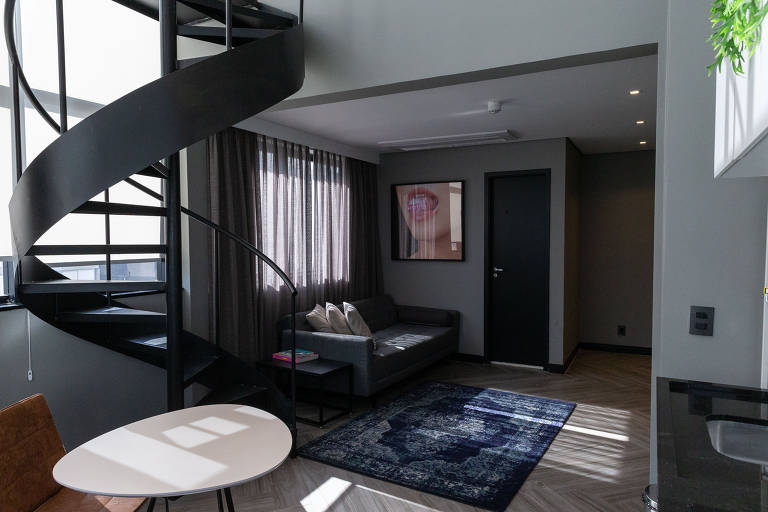Ban on short-term rentals in affordable housing in São Paulo affects the studio market

The push for compact apartments for short-term rentals, which has gained momentum in recent years in São Paulo, is beginning to lose steam with the entry into force of new city hall rules for the real estate sector.
Owners of properties intended for affordable housing will have to adapt, as they will no longer be able to operate under the "short stay" model—only traditional rentals and within the values stipulated by the program.

Acquired by investors focused on platforms like Airbnb, units up to 40 m² were driven by higher returns compared to conventional residential rentals.
According to property managers, profitability exceeded traditional lease agreements by 50%. The "short-stay" model also served as a gateway into the real estate market for small investors, with average asking prices below R$400,000.
This cycle is beginning to change with the recent municipal government measure, which prohibited short-term rentals in properties classified as HIS (Social Interest Housing) and HMP (Low-Income Housing). These units are sold for up to R$266,000, targeted at families earning up to three minimum wages (HIS-1), for up to R$369,000 for families earning up to six minimum wages (HIS-2), and for up to R$518,000 for families earning between six and ten minimum wages (HMP).
The decision — in effect since May 30 — aims to ensure that these affordable homes are actually inhabited by low-income families, combating misuse and housing fraud .
The decree states that anyone who rents an apartment to someone who doesn't fit the target audience may be required to pay an amount equivalent to the tax incentive received for the construction of the property, taxes, and other charges, in addition to a fine double that amount. The company responsible for the development is also subject to penalties.
The Municipal Department of Urban Planning and Licensing (SMUL) reported having applied more than R$31 million in fines to companies for failing to comply with the rules for selling these properties.
Airbnb argues that vacation rentals are legal in Brazil, regulated by the Tenant Law (Law No. 8,245/1991), but the city reinforces the need for responsible use and compliance with social housing policies.
For the FIIs (Real Estate Investment Funds) market, the decree represents a risk, especially for those with exposure to properties classified in these ranges and with a strategy focused on short-term investments.
Experts such as Felipe Ribeiro, manager at Rio Bravo Investimentos, and Pedro Ros, CEO of Referência Capital, say the change directly affects revenue generation and could lead to portfolio reevaluations and eventual repricing of shares in the secondary market.
"THE The revenue-generating basis of these assets is directly affected by a regulatory change. On the other hand, it's important to contextualize: most listed funds that invest in compact, short-term properties are concentrated in units outside these ranges, which mitigates the broader sectoral impact," says Ribeiro.
According to Ribeiro, there are some funds with exposure to compact properties in São Paulo, but the representation of assets classified as HIS or HMP within their portfolios is low. "The market still lacks a precise assessment, and each manager will likely provide this information in future letters to shareholders, if the impact is material," he says.
André Sawaya of AZ Quest assesses that FIIs' exposure to short-term rentals in affordable housing units is marginal. He believes the new rule could even increase institutional investor participation, as the regulation more clearly defines permitted uses and restricts fraud.
The alternatives, experts say, include migrating to long-term leases—with lower returns—or asset disposal. For units outside the HIS and HMP bands, the appeal of "short stays" remains, but under greater regulatory scrutiny. The search for well-located developments, close to transportation infrastructure , remains strategic.
For Rafael Rossi, CEO of Conviva, a property management company focused on short-term rentals, the market is adjusting. "The product is changing, paying less for the land, etc. I don't see a drop in investor demand, as they will continue to seek studios outside of the social program," he says.
According to Rossi, Conviva has less than 5% of its portfolio in São Paulo in projects with HIS or HMP classification.
Housi, which operates with a flexible housing model, has adapted its strategy. The company told Folha that it has created a specialized area to broker traditional rentals of units within socially acceptable ranges, focusing on families that meet the criteria of the city's programs.
When contacted, the developers that work in partnership with the "short stay" platforms declined to comment on the São Paulo City Hall's decision.
Abrainc (Brazilian Association of Real Estate Developers) says it is closely monitoring the recent changes made by the São Paulo city government and is available to "contribute with suggestions" that "ensure the effectiveness of housing policies without compromising the stability of the business environment and the investments made."
The São Paulo regulation follows a trend seen in large cities, with pressure on housing prices. In the US, rent control policies are more restrictive than the São Paulo decree. In Barcelona , approximately 66,000 listings were removed from digital platforms at the request of the local government.
In Brazil, the validity of short-term rentals in residential condominiums is still awaiting a ruling from the Superior Court of Justice (STJ). Rodrigo Karpat, president of the Condominium Law Committee of the São Paulo Bar Association (OAB-SP), says that while there is no definitive rule on short-term rentals, it is up to condominiums to update their bylaws to establish clear rules, ensuring predictability and legal certainty.
uol






